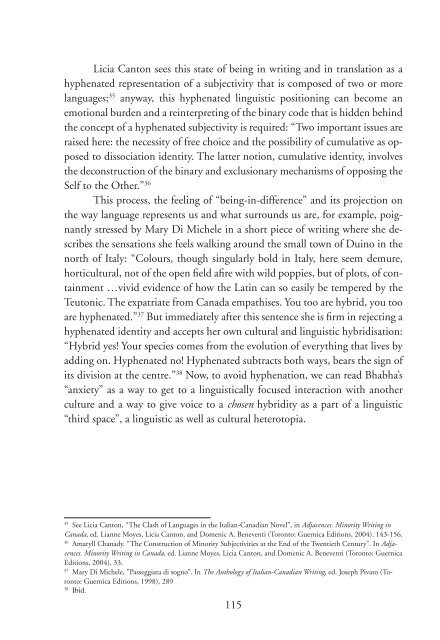Teaching Subjectivity. Travelling Selves for Feminist ... - MailChimp
Teaching Subjectivity. Travelling Selves for Feminist ... - MailChimp
Teaching Subjectivity. Travelling Selves for Feminist ... - MailChimp
You also want an ePaper? Increase the reach of your titles
YUMPU automatically turns print PDFs into web optimized ePapers that Google loves.
Licia Canton sees this state of being in writing and in translation as a<br />
hyphenated representation of a subjectivity that is composed of two or more<br />
languages; 35 anyway, this hyphenated linguistic positioning can become an<br />
emotional burden and a reinterpreting of the binary code that is hidden behind<br />
the concept of a hyphenated subjectivity is required: “Two important issues are<br />
raised here: the necessity of free choice and the possibility of cumulative as opposed<br />
to dissociation identity. The latter notion, cumulative identity, involves<br />
the deconstruction of the binary and exclusionary mechanisms of opposing the<br />
Self to the Other.” 36<br />
This process, the feeling of “being-in-difference” and its projection on<br />
the way language represents us and what surrounds us are, <strong>for</strong> example, poignantly<br />
stressed by Mary Di Michele in a short piece of writing where she describes<br />
the sensations she feels walking around the small town of Duino in the<br />
north of Italy: “Colours, though singularly bold in Italy, here seem demure,<br />
horticultural, not of the open field afire with wild poppies, but of plots, of containment<br />
…vivid evidence of how the Latin can so easily be tempered by the<br />
Teutonic. The expatriate from Canada empathises. You too are hybrid, you too<br />
are hyphenated.” 37 But immediately after this sentence she is firm in rejecting a<br />
hyphenated identity and accepts her own cultural and linguistic hybridisation:<br />
“Hybrid yes! Your species comes from the evolution of everything that lives by<br />
adding on. Hyphenated no! Hyphenated subtracts both ways, bears the sign of<br />
its division at the centre.” 38 Now, to avoid hyphenation, we can read Bhabha’s<br />
“anxiety” as a way to get to a linguistically focused interaction with another<br />
culture and a way to give voice to a chosen hybridity as a part of a linguistic<br />
“third space”, a linguistic as well as cultural heterotopia.<br />
35<br />
See Licia Canton, “The Clash of Languages in the Italian-Canadian Novel”, in Adjacences. Minority Writing in<br />
Canada, ed. Lianne Moyes, Licia Canton, and Domenic A. Beneventi (Toronto: Guernica Editions, 2004). 143-156.<br />
36<br />
Amaryll Chanady. “The Construction of Minority Subjectivities at the End of the Twentieth Century”. In Adjacences.<br />
Minority Writing in Canada, ed. Lianne Moyes, Licia Canton, and Domenic A. Beneventi (Toronto: Guernica<br />
Editions, 2004), 33.<br />
37<br />
Mary Di Michele, ”Passeggiata di sogno”. In The Anthology of Italian-Canadian Writing, ed. Joseph Pivato (Toronto:<br />
Guernica Editions, 1998), 289<br />
38<br />
Ibid.<br />
115

















